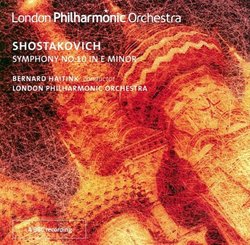| All Artists: Dmitry Shostakovich, Bernard Haitink, London Philharmonic Orchestra Title: Shostakovich: Symphony No. 10 in E minor Members Wishing: 0 Total Copies: 0 Label: LONDON PHILHARMONIC Release Date: 9/30/2008 Genre: Classical Styles: Historical Periods, Modern, 20th, & 21st Century, Symphonies Number of Discs: 1 SwapaCD Credits: 1 UPC: 854990001345 |
Search - Dmitry Shostakovich, Bernard Haitink, London Philharmonic Orchestra :: Shostakovich: Symphony No. 10 in E minor
 | Dmitry Shostakovich, Bernard Haitink, London Philharmonic Orchestra Shostakovich: Symphony No. 10 in E minor Genre: Classical |
Larger Image |
CD Details |
CD ReviewsPowerful performance in less than ideal sound MartinP | Nijmegen, The Netherlands | 10/12/2008 (4 out of 5 stars) "This is undoubtedly a very impressive performance of what is often considered to be Shostakovich's best symphony. Haitink most effectively conveys the despair of the first movement's bleak expanses, even if at times one misses a sense of forward momentum - but the occasional feeling of stagnation or tentative progress is not unfitting. The brutality of the second movement comes across vividly, though here the muddled sound of the recording robs it from its ultimate effect. The third movement is suitably wistful, not too surefooted as it is with some. The Finale has a frenzied abandon that may surprise some who know Haitink as a rather sober conductor. The orchestral playing is excellent all round, but the horns deserve a special accolade: their powerful, whooping cries in the final D-S-C-H statement are an absolute delight. Overall timing is on the slow side, some 4 minutes slower than the average of the competition. Frantic applause bursts in even before the final chord has sounded out, for this is a recording taken from the BBC Proms archive, which was made live in Royal Albert Hall in 1986. After a slightly messy beginning audience noise is, fortunately, well within acceptable bounds, but the recording suffers from some very odd and shifting balances, and in fact in my copy of the CD the left and right stereo channels have swapped places. Quiet passages tend to recede into a cavernous distance and can sound disembodied, while fortes have a satisfying, bass-dominated power but obscure a lot of detail (in particular I found several important trumpet solos to have been rendered nearly or entirely inaudible). In all this would hardly be a first choice for buyers seeking only one version of this symphony - Jansons, the digital Karajan or even Skrowaszewski and the Hallé Orchestra are safer bets for that. But it is a worthwhile addition as a flawed but impressive alternative version. " An impressive Tenth, just short of the best Santa Fe Listener | Santa Fe, NM USA | 05/16/2010 (4 out of 5 stars) "I agree with the lead review in most respects, although no one needs to fear the sonics on this live Shostakovich Tenth. The BBC long ago figured out how to tame the vastness of Royal Albert Hall, and there is no "cavernous" reverberation or fatal loss of detail. One hears that the acoustic is ample; nothing wrong with that -- in fact, the Chandos label aims for this very sound.
The London Phil. was Haitink's orchestra for twelve years, from 1967 onward. He stabilized it and brought up the standards of execution. But by 1986, when the orchestra was almost a decade into playing for the far more dynamic Tennstedt, they had risen even further. Maybe they wanted to demonstrate the fact with this recording, given that Haitink had already used the London Phil. for his Tenth on Decca in 1977. Timings for each movement remain the same in both readings, within ten seconds or so in most cases. The new reading starts out a bit too tamely, but by the time the wrenching climaxes of the first movement arrive, the orchestra is fully committed, and Haitink seems to be, too. If only Tennstedt had taken up Shostakovich to any degree. The Scherzo is very propulsive, energized to a degree that will surprise listeners who have stereotyped Haitink in their own minds. It's not as bitter or biting as in Mravinsky's account, but we are caught up in a hwilrwind nonetheless. The two final movements have always been problematic, so decidedly do they back away from the monumental tragic intentions promised by the first half of the symphony. It's hard to avoid anticlimax, and those who can -- Mravinsky, Karajan, Kondrashin, and Stokowski (available only in a box set issued by the Chicago Sym.) -- set themselves apart. We have yet to hear what Gergiev has to say on disc in this work. The third movement Allegretto tiptoes rather timidly, and Haitink seems to want to move on quickly. His reading lacks incisiveness and pungency, but one cannot argue with its effectiveness. He manages to avoid triviality. The finale opens with an extensive Andante section that runs the danger of making little sense emotionally; it is so spare and reflective that the conductor needs to find some underlying meaning. Haitink falls short here; the music ambles quietly until he reaches the Allegro, which again seems a bit detached. It's vivacious without being vital. Apparently Haitink is content to take this circus music at face value rather than giving it an ironic twist. So be it. The audience leaps to tis feet after Haitink manages to energize the last few minutes. In every respect he and his beloved London Phil. are closely connected in a performance that deserves to be set down for posterity. However, if you already own their studio account on Decca, that will probably serve." |
